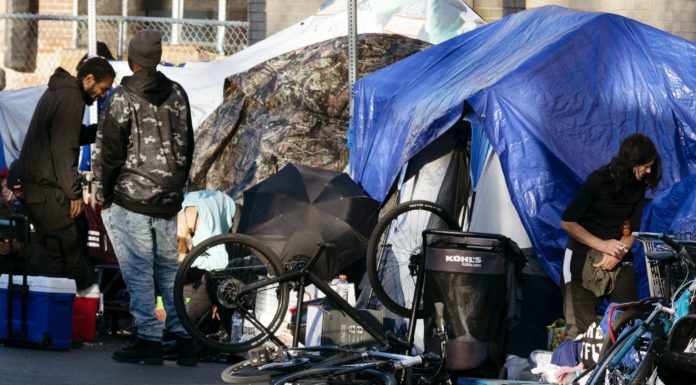(Jon Miltimore, FEE) One thing Lang Martinez said he learned after living on the streets of Ventura County, California , was that being homeless was worse than being in prison.
“It’s a different lifestyle. You think prison is bad? No. Prison’s got structure,” Martinez, a former Los Angeles gang member-turned-advocate against homelessness, recently told California Insider. “The streets got what they call rules of engagement.”
Though Martinez agrees with the conventional wisdom that mental illness and drug abuse are the primary catalysts for homelessness, new academic research suggests the picture is more complicated.
A fresh study out of University of California, San Francisco suggests that losing income is the single biggest driver of homelessness — ahead of mental illness, drug addiction, and other causes — the study authors say.
“I think it’s really important to note how [desperate] poor people are, and how much it is their poverty and the high housing costs that are leading to this crisis,” said Margot Kushel, a physician and leader of the UCSF Benioff Homelessness and Housing Initiative, which conducted the study.
California is home to approximately 30% of the entire U.S. homeless population (115,491 people as of 2022 ), and some advocates expressed hope that the new research would “inform a statewide strategy” to combat the problem.
Separate research, however, suggests California’s own policies have exacerbated its homelessness epidemic, including a new paper written by University of California economist Seth J. Hill titled “ Minimum Wages and Homelessness ” published last month.
Utilizing data from the Department of Housing and Urban Development and other sources, Hill examined 100 cities from 2006-2019 to determine the relationship between wage floors and homelessness. The findings are bleak.
“Merging administrative data from HUD to state and local minimum wage laws suggests that minimum wages induce increases in homeless counts,” Hill writes. “When cities raise their minimum wage by 10%, relative homeless counts increase by three to four percent.”
Hill’s paper will not be the last word on the relationship between minimum wage laws and homelessness, but it provides yet more evidence of a stubborn reality minimum wage proponents often overlook: Minimum wage laws often harm the very people they are designed to help.
For decades, it was an all but universally accepted economic gospel that increases in the minimum wage came with adverse trade-offs. Many economists often pointed out these adverse consequences, including job losses, often fell on workers with the least skills and those who were the least valued.
“Among the effects of a minimum wage law, when it is effective, is that many unskilled and inexperienced workers are priced out of a job, when employers do not find them worth what the law specifies,” the economist Thomas Sowell once observed.
This is why even left-leaning publications such as the New York Times, until relatively recently, conceded that using minimum wage laws to combat poverty was an “old, honorable — and fundamentally flawed” idea because it would “price working poor people out of the job market.”
That minimum wage hikes increase unemployment was once hardly a debatable subject among economists, and even today a scouring of the literature shows that a “clear preponderance” of the scientific research shows a job-killing impact.
So in light of this evidence and the more recent UCSF findings, Hill’s conclusion should not surprise us.
“To the extent minimum wages cause disemployment of low skill-workers, the lost job can exacerbate existing economic insecurity and lessen ability to pay for housing,” he writes.
This finding is not just tragic but ironic. Politicians and wage-justice fundamentalists, who take pride in the idea they are fighting poverty by advocating for higher minimum wage laws, are not just costing countless lower-skilled workers jobs. They are actually pushing many of them into homelessness.
Again, this should not be a surprise. Decades ago, the economist Murray Rothbard famously observed the absurdity in the idea that banning jobs was a path to prosperity.
“Remember that the minimum wage law provides no jobs,” Rothbard wrote , “it only outlaws them; and outlawed jobs are the inevitable result.”



